OSCE calls for immediate ceasefire as situation in Ukraine deteriorates

OSCE Chairperson-in-Office and Serbian Foreign Minister Ivica Dacic called for an immediate ceasefire on Saturday, as the situation in Ukraine has rapidly deteriorated in the past 24 hours.
Dacic’s call comes after more than 20 civilians have been killed and many more injured in the latest clashes between Ukrainian troops and pro-Russian separatists, the Guardian reports.
The Serbian Foreign Minister urged parties in the conflict to comply with the Minsk Protocol of 5 September 2014 and the Memorandum of 19 September 2014.
Dacic also pointed to the Declaration, adopted at a special meeting of the OSCE Permanent Council on January 20, which called for an immediate ceasefire and full implementation of the Minsk documents.
On Friday separate shelling attacks were reported in Donetsk, Debaltseve and other areas, which left 15 Ukrainian soldiers dead and 30 wounded.
The fight has been particularly fierce around the town of Debaltseve, which is of strategic importance as it is a major rail and road junction. The pro-Russian rebels claimed to have captured the nearby town of Vuhlehirsk and partly encircled thousands of government troops in Debaltseve.
These developments come as the contact group, which was initially scheduled to meet on Friday, is expected to gather in Minsk on Saturday.
At it representatives of Ukraine, Russia, the separatists and the OSCE will attempt to push for the implementation of the Minsk agreement and the restoration of the peace talks.




